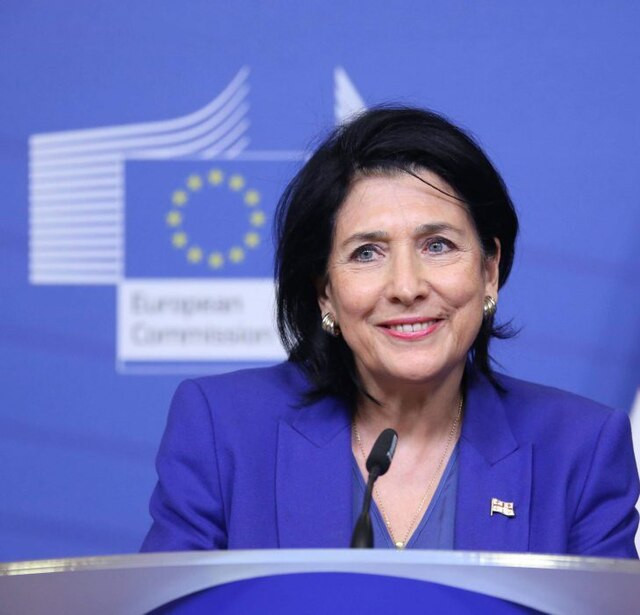President Salome Zourabichvili on Monday called for mass protests after the ruling party, Georgian Dream, claimed victory in a contentious parliamentary election over the weekend. The outcome has intensified political tensions in the strategically located South Caucasus nation and raised concerns among Western allies about its democratic trajectory and alignment with Russia.
With nearly all precincts counted, the Central Election Commission reported that Georgian Dream secured approximately 54% of the vote in Saturday's election. Opposition parties have contested the results, alleging widespread electoral violations, including voter intimidation, vote-buying, and physical violence at polling stations.
"I do not recognize the results of this election," President Zourabichvili declared in a televised address. Referring to the vote as a "Russian special operation," she urged citizens to gather in central Tbilisi to protest what she described as an assault on Georgia's democratic future. "Nobody can take away Georgia's European future," she asserted.
The election has been viewed domestically and internationally as a referendum on Georgia's geopolitical orientation-whether it will continue to pursue integration with the European Union and NATO or drift further into Moscow's sphere of influence. The ruling Georgian Dream party, in power since 2012, has been criticized for adopting policies resembling those of Russia, including laws that curb media freedom and civil liberties.
European electoral observers from the Organization for Security and Co-operation in Europe (OSCE) described the election environment as "divisive" and marked by "widespread and consistent allegations of intimidation and pressure on voters." Antonio López-Istúriz White, head of the European Parliament monitoring delegation, noted that the ruling party promoted "Russian misinformation, manipulations, and conspiracy theories" during the campaign.
The United States and the European Union have called for a thorough investigation into the reported electoral violations. U.S. Secretary of State Antony Blinken emphasized the importance of respecting the rule of law and addressing deficiencies in the electoral process. "Georgia's European and Euro-Atlantic integration goals require that the government respect the rights of members of civil society and the fundamental freedoms of all Georgian citizens," Mr. Blinken said in a statement.
Prime Minister Irakli Kobakhidze, a member of Georgian Dream, hailed the election outcome as an "impressive and obvious" victory. "Any attempts to talk about election manipulation are doomed to failure," he told supporters. Mr. Kobakhidze reiterated the government's commitment to European integration, targeting EU membership by 2030.
However, opposition parties and pro-Western Georgians remain skeptical. Tina Bokuchava, a leader of the main opposition party, the United National Movement, declared, "We do not accept these stolen election results and we are not going to recognize them." She called for unity among opposition forces to restore Georgia's "European future."
The political unrest has sparked fears of potential violence. Analysts warn that mass protests could escalate into clashes between demonstrators and security forces, reminiscent of earlier confrontations this year following controversial government actions. "I would expect the ruling Georgian Dream regime to deploy large numbers of security forces and use maximum pressure to tough it out with demonstrators," said Timothy Ash, an emerging markets strategist at BlueBay Asset Management.
Russia, which fought a brief war with Georgia in 2008 and continues to occupy about 20% of its territory, has denied any interference in the election. Kremlin spokesman Dmitry Peskov dismissed allegations of meddling as "absolutely unfounded," asserting that such accusations have become standard against Russia without evidence.
The election results have significant implications for Georgia's international relations. The European Union suspended Georgia's membership candidacy earlier this year due to concerns over democratic backsliding. The introduction of a "foreign influence" law resembling Russian legislation was met with mass protests and criticism from Western governments.
Hungarian Prime Minister Viktor Orbán, a close ally of Russian President Vladimir Putin, was the first foreign leader to congratulate Georgian Dream on its victory. Mr. Orbán is scheduled to visit Tbilisi this week to meet with Prime Minister Kobakhidze, signaling potential shifts in Georgia's foreign policy alliances.
In the capital, sentiments of frustration and disappointment were palpable among citizens advocating for closer ties with Europe. "The results that were published are just lies and rigged," said Tiko Gelashvili, a 32-year-old resident of Tbilisi. "We want a future in Europe, not under Russian influence."




